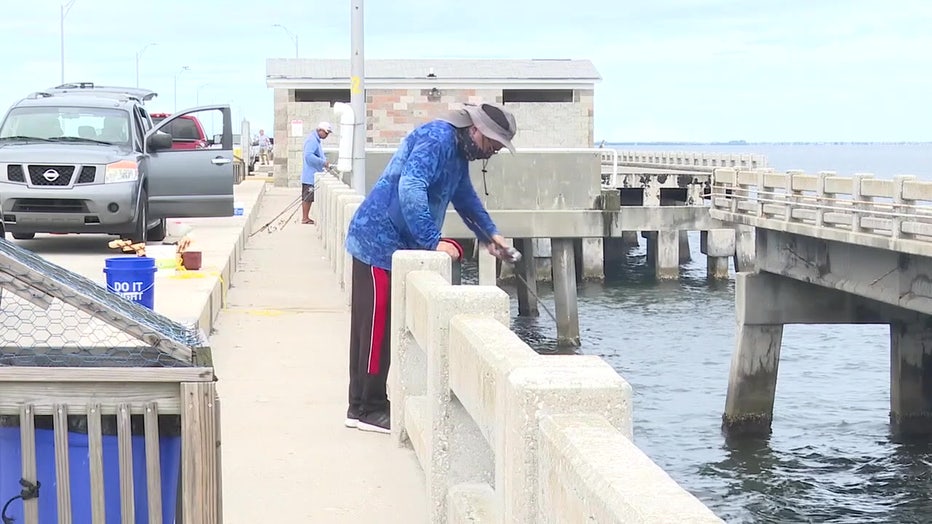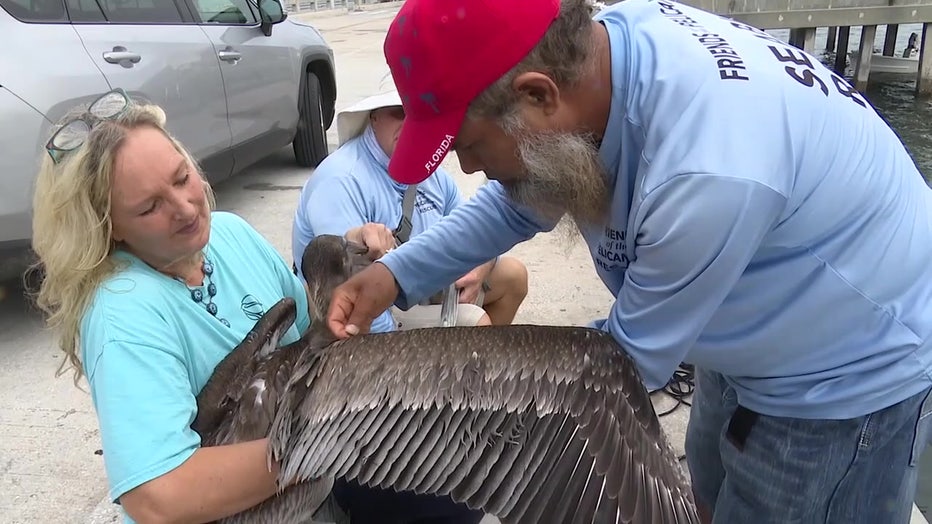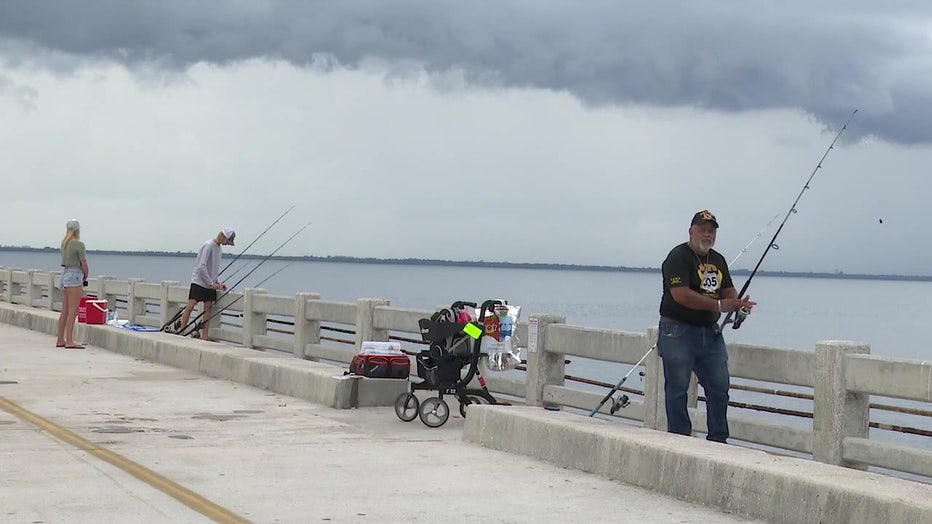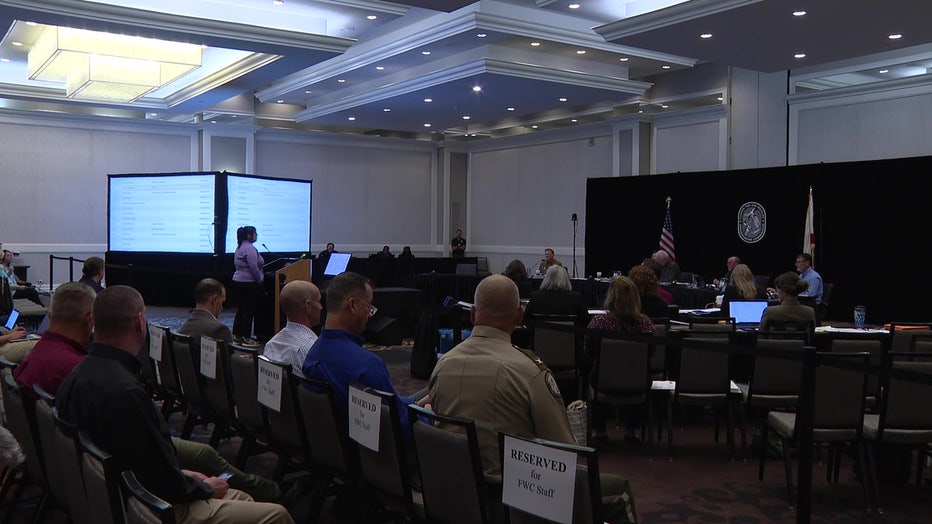New FWC regulations on Skyway Fishing Pier is compromise for conservationists and anglers to protect seabirds
ST. PETERSBURG, Fla. - Fishermen on the Skyway Fishing Pier will have some new regulations starting October first.
FWC commissioners approved the staff’s recommended fishing rules for the pier at its meeting Wednesday. It’s in an effort to try to protect seabirds, particularly pelicans, from getting entangled in lines and hooks.
According to the FWC, entanglements happen more often at the Skyway than at any other pier. Hundreds of pelicans and other seabirds get entangled in fishing gear there each year, the FWC said.
The pier has created an artificial reef for seabirds and they breed nearby. It's also one of the most popular piers in the state, with about 200,000 visitors annually, according to the FWC.
READ: Scientists at Florida Aquarium working to restore declining coral reefs along Florida’s coastline
The commissioner's new regulations include requiring fishermen to take an annual online education class and have proof of it to fish, a ban on fishing gear with multiple hooks from November 15 to March 15, and a limit of two sets of hook and line fishing gear per fisherman.
Before the commissioners made their decision, 52 people spoke during the public comment period. Fishermen and conservationists have debated the issue for years.

"It's our moral responsibility to stop this carnage," one woman said.
"I'm not necessarily in favor of this," one man said. "Putting some of these restrictions in, you're actually taking away from some people's livelihoods and their form of making money and providing," he said.
Others said they felt like the regulations didn't go far enough and called for a year-round ban on fishing gear with multiple hooks.
READ: Tampa restaurants and non-profit team up to create more oyster habitats
"Fishing is part of the fabric of Florida," one woman said. "We're not disputing that, but Floridians really also care about protecting birds and not harming them even if it's done unintentionally," she said.

Some fishermen said they want to see solutions to deter pelicans from the pier too.
Captain Dylan Hubbard of Hubbard's Marina called the commissioners' decision a compromise.
"While compromises are never fun, everybody takes a hit. I didn't want to see gear restrictions at all. I didn't want to see the limitations that we're facing in this rule. But I think it's a good step forward. Something has to be done to kind of curb these severe entanglements," Hubbard said.
READ: Fishing line, hooks leading cause of brown pelican deaths, officials say
"I guess the definition of a compromise is that no one is happy, so I think we've succeeded," Commissioner Gary Lester said.

"It's a really tough issue that we have a lot of folks in the middle, but we have a lot of folks sort of on each end of the spectrum in this conversation that are never going to be satisfied by anything we do because they feel strongly on one end of the spectrum than the other," Lester said.
Kim Begay, Vice President of the Clearwater Audubon Society, said the restrictions could've gone further. She wanted to see gear with multiple hooks banned year-round.
"I think this is a beginning and we have some room to work in the future towards, you know, the restrictions that we'd like to see," Begay said.

Vice Chairman Steven Hudson motioned to ban Sabiki hooks year-round. It was met with applause from some, but it didn't pass.
"There’s a lot of fishing opportunity in Florida, but there’s very limited opportunities for brown pelicans and that’s how I view this as an avid fisherman," Commissioner Rodney Barreto said.
The FWC also received $20,000 from the Fish and Wildlife Foundation of Florida’s Conserve Wildlife Tag grant program.
It will help with education and outreach on the pier. The FWC also plans to hire a full-time staff member to help with education on the pier.

Organizers also stood outside the FWC’s meeting protesting a separate issue: what the agency sprays into some waterways.
The group, Florida Lake Shepherds, said it’s destroying ecosystems across the state.
The FWC said its Invasive Plant Management Section sprays waterways to maintain invasive plants, not harm wildlife. The agency said some of the plants can impede flood control. Managing the invasive species, FWC says, keeps the ecosystem healthy.
Eric Cassels, a commercial fisherman, said he has witnessed something far different.
"The fishery itself is being wiped out by taking away the grasses," Cassels said. "The grasses are also our filter, but the grass is sort of like the fish’s home. If you take the grass away, your small fish gets eaten up by the big fish, kind of like a fishbowl effect. If you add small fish to big fish, the big fish eat them all," he said.
The FWC said it protects beneficial aquatic plants through permits and funding.
Florida Lake Shepherds protested both days of the FWC’s Commission meeting.

